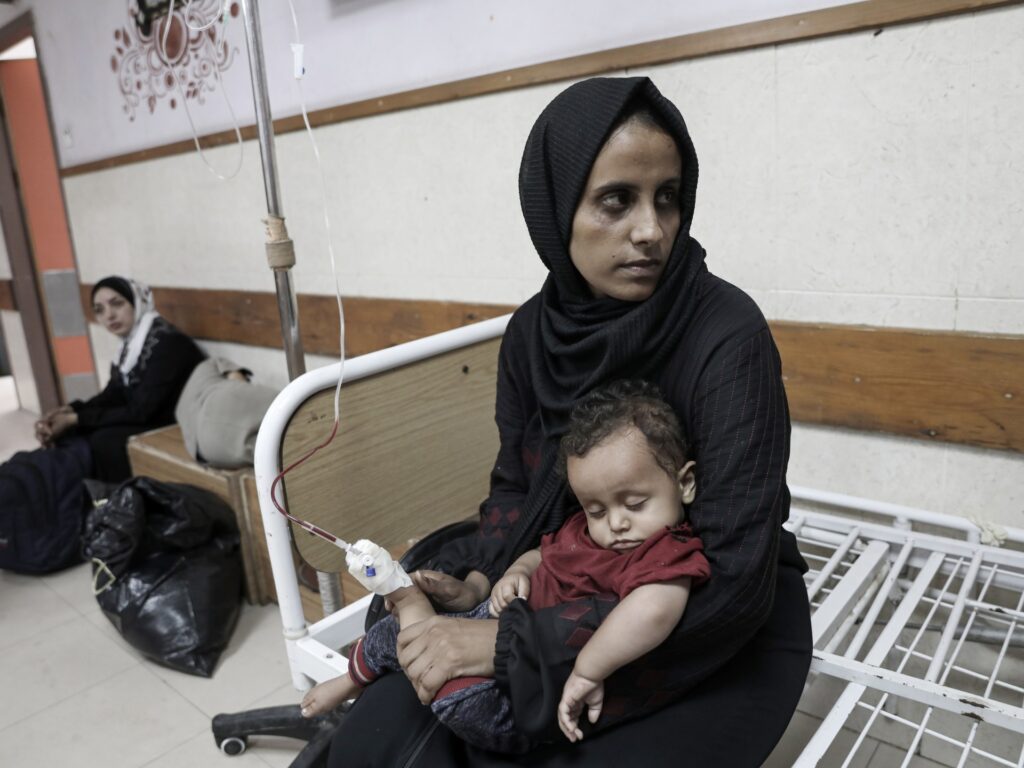Deir el-Balah, Gaza – Maha Abu Shamas, 27, has been preparing her four children, all under 10, to receive their polio vaccination since the early hours of the morning.
Maha, a mother of five, has been living in a classroom in the central Gaza Strip’s Deir el-Balah since the family was displaced from Beit Hanoon in the north last November.
“When I heard about the threat of polio spreading, I was afraid for my children. When I heard that a case of paralysis was confirmed, I felt like my world had collapsed,” said Maha, holding her nine-month-old boy in the busy pediatric ward of Al-Aqsa Martyrs Hospital, the last functioning medical facility in Deir el-Balah.
Last month, Gaza’s health ministry confirmed the first case of polio in the enclave in 25 years – a 10-month-old boy who is now paralyzed in one leg – after the poliovirus was detected in sewage. The United Nations, working with Gaza’s health authorities, has launched a vaccination campaign to protect children from polio, which can cause irreversible paralysis of limbs and even death. Some 640,000 children under the age of 10 will receive oral drops of the vaccine to protect them from the virus, which mainly affects children under the age of five, is highly contagious and has no cure.
The threat of polio has only compounded Maha’s concerns. Displaced parents like her already face harsh and unsanitary living conditions in shelters like the school where Maha and her children live, and in Gaza’s tent camps, as they try to survive Israel’s war on Gaza that has killed more than 40,700 Palestinians.
“Lack of hygiene is the main characteristic due to overcrowding, collapsed infrastructure and a catastrophic health situation,” she explains.
“The school where I live is full of puddles of sewage,” Maha adds. “I cannot ensure the cleanliness and health of my children in these conditions.”
In addition to taking her children to Al-Aqsa Hospital for vaccinations, Maha had to take her youngest child to the pediatric ward after three days of high fever and vomiting.
“This is how I spend most of my days during the war: taking my sick children to the hospital to be treated because of the spread of diseases, if possible,” she explains. “If this is how we fight minor illnesses like gastroenteritis, how can we fight serious diseases like polio?”
Maha’s life took a dramatic turn last month when her husband was killed in an Israeli airstrike near their shelter. “Today, I am the sole caregiver for five children. It’s overwhelming, but like thousands of mothers in Gaza, I have no choice but to keep going.”
While she welcomes the polio vaccination campaign, she stresses that it addresses only one of the threats posed by dire living conditions. “Malnutrition, hepatitis, skin diseases, exhaustion: our children face many threats. The real solution lies in improving living conditions and ending the war,” she says. “We have suffered enough.”
For Hanin Abdullah, 31, the decision to vaccinate her children against polio was fraught with hesitation.
Hanin, a mother of three young children, was displaced with her family from Jabalia in northern Gaza, and they now share a cramped space with 25 members of her family.
“In the same classroom there are about 40 other people,” she said, speaking at Al-Aqsa Hospital, describing her situation as tragic.
The school where she lives is crowded, sewage accumulates everywhere and the queues for the toilets are long. The exterior walls are black from the wood fires used for cooking.
She says she no longer has confidence in any action taken by international organizations regarding the health of children in Gaza.
“Our children are killed every day by bombs and missiles, even in areas that are supposed to be safe. Some are beheaded,” she says bitterly.
“This madness still continues and yet all they talk about is the fear of polio?”
Like many displaced families in her shelter, Hanin initially resisted vaccinating her children.
“People here have lost faith in anything global or Western,” she explains.
“Some displaced people believe conspiracy theories that vaccines contain substances planted by Israel and the United States to weaken our children.”
Despite her doubts, she ultimately felt she could not risk her children’s health, especially after hearing about a confirmed case of polio in Gaza, so she took them to the hospital.
“I understand the despair of families living in war conditions. We are like the living dead, trapped in unbearable conditions,” she said, holding her little boy in her arms.
“I gave birth to my child last November and since then he has had a tragic childhood in the shelter,” she says, frustrated.
“He has no proper food, no clothes, no toys. He suffers from rashes and constant fatigue.”
For Hanin, the fight against polio is just a small part of a larger battle.
“It is important to protect our children from polio, but the real fight is against the living conditions imposed by war. These conditions destroy their mental and psychological health, and even their future,” she says.
“What is the point of vaccinating children and protecting them from diseases, when the war that kills them every day continues? It is absurd.”

